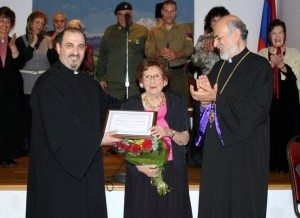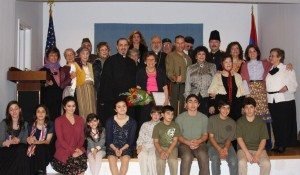TEANECK, N.J.—A new musical is taking the Armenian community by storm, judging by the three rousing performances in as many states this spring.

It’s the adventures of the Hye Legion volunteers—the Gamavors—recalling the courage of Armenian American men who left the safety of their homes in America and returned to the genocide killing fields.
Alarming news had reached them in America. Turks were repeatedly attacking survivors and orphans, torching villages left standing.
Facing the threat of a renewed genocide, World War I, and the Russian Revolution, Gamavor legionnaires volunteered to go back and fight for their beloved Armenia.
“These brand new Americans, many of them genocide survivors themselves, returned to the homeland to face certain death at the hands of the Turkish-German armies in the Arara-Palestine War of 1918,” said Hourig Papazian-Sahagian, troupe leader and playwright.
“The pages of Gamavor history are filled with international intrigue and false promises,” she resumed. “The incredible sacrifice of these selfless men has lingered in archives and museums for nine decades. Their story cries out for voices raised in honor of their heroic lives and deeds. They did not question, nor did they falter.”
According to Papazian-Sahagian, this segment of Armenian American history was overlooked by many and unknown by most.
“This story must take its place in the pages of human history as a brilliant display of extraordinary courage,” she pointed out.
So the 86-year-old playwright went to work on a new script, fresh off the heels of “Hello Ellis Island,” which was staged with vast success throughout the Eastern Seaboard. That particular episode delineated the story of our early immigrants to America, told with pathos, light-heartedness, and emotion.

“The impact has been huge,” said Papazian-Sahagian. “Audiences reacted with joyful tears and nostalgia while identifying with the show’s characters. Best remembered are the dozen or more songs in every production.”
Great Armenian leaders played critical roles in the Gamavor movement: General Antranig initiated the plan, joined by General John Shishmanian, an Armenian American from Kentucky, who led the Gamavor campaigns in historic Armenia.
A cast of 30 makes up the current team, joined by 3 semi-professional actors and an ensemble of 4 musicians. The show runs about 80 minutes with no intermission, enhanced by striking costumes and sets designed by the playwright herself.
Papazian-Sahagian prepared herself diligently for a concert career; she was educated at Juilliard Conservatory with degrees from New York University in education and music. She taught public school music in New York and New Jersey, before establishing herself as an Armenian educator.
She was founding principal of the Hovnanian Day School before serving 20 years as director of the Armenian National Education Committee (ANEC) for the Eastern Prelacy.
Her “retirement” years have been dedicated to the performing arts—producing, directing, arranging music, and playing keyboard with her band at these shows.
“The Way We Were” folk art ensemble was established in the 1980’s with her close friend Sossy Kadian. When she retired, “Deegeen Hourig, as she’s affectionately known, ventured on with her passion.
“At the time, we were alarmed that traditional Armenian music and dance had virtually disappeared from Armenian American stages,” she said. “Ironically, those traditions have been transported here from historic Armenia villages by genocide survivors. As beloved folk song faded away, Yerevan-style, Russian-flavored music began to flood the entertainment scene in this country.”
With her folk arts ensemble, a cast of dedicated volunteers set foot to revive the neglected traditions while providing a heritage for Armenian American generations. The mission has boomeranged in every direction and given neophyte performers a stage on which to stand and be noticed.
“I’m on my soap box here,” she laughs. “I recognize that song is a very powerful communicator and that music is a living entity which constantly evolves. However, I also know that given a political environment, an entire culture can be obliterated and replaced with the ‘new style.’ Thus, the soul of a people and its cultural history is often relegated to the dust bin of academic archives.”
What prompted the writing of “Gamavor” was an insatiable quest to tell her nation’s history. While researching “Ellis island,” Papazian-Sahagian also delved into the Gamavor movement, a closely related theme.
She had no Gamavors in her family but two members of her cast had a father and father-in-law in the ranks. As a young child, she remembers an imposing gentleman seated in his wheelchair on the sidewalk in front of St. Illuminator’s Church in New York City.
“My father quieted my fear of him by explaining that he ate a bullet…he was a Gamavor,” Papazian-Sahagian recalled. “The selfless courage of the Gamavors–their profound humanity and devotion to lost lands and people—inspired me to write the play. Unfortunately, many are unaware of the movement and its heroes. ”
There was help along the way from writers like Peter Balakian and his editor, Doris Varjabedian-Cross, a friend to Hourig. Once the cast was assembled, two years of rehearsals followed prior to the show’s premiere on April 29 at the Sts. Vartanantz Church in New Jersey.
The play’s main character, commander Shishmanian, together with colleagues Antranig, Chankalian, and Sebouh, are factual, along with the battle scenes. Papazian-Sahagian embellished the story with drama and romance while adding a dozen patriotic and fedayee songs.
“Judging from the emotional reaction of Gamavor relatives in attendance at our three shows, it’s safe to say that if Gamavor veterans were alive today, they would take pride in the knowledge that they have finally emerged from the faded pages of forgotten history,” said Papazian-Sahagian.
Bringing such a tale to life was indeed a challenge, much like the battle scenes and teaching a song repertoire to amateur voices. Through it all, the playwright has remained resilient and steadfast.
“The cast bonded together as a family unit, keeping the energy level at a high pitch. There’s no generation gap with the members, regardless of their ages and personalities.”
As the Armenian Genocide centennial approaches in three years, Papazian-Sahagian sees entertainment festivals bringing the arts together. She sees lectures and exhibits as the Armenian Library and Museum of America gushes forth with its Gamavor Traveling Exhibit.
She sees no immediate end to the possibilities her show may encounter through the year 2015.
“It’ll be in demand, just as we will be winding down with it,” she predicts. “This all might occur after my time. Until that moment, I plan to continue enjoying the vitality this show is bringing to all of us.”


Be the first to comment